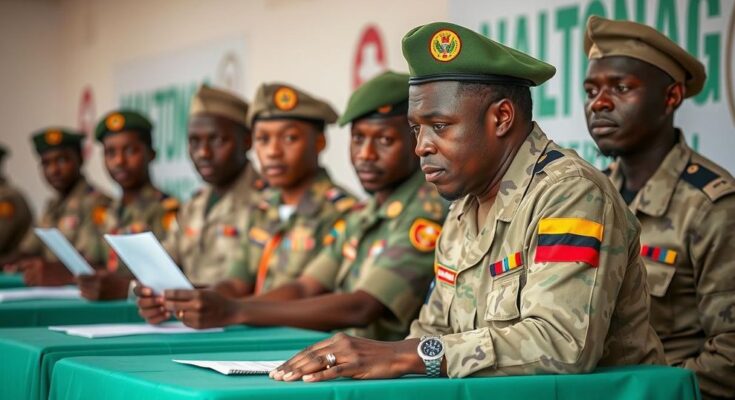Chad voters participate in elections amid opposition boycotts following military rule. Allegations of fraud, political repression, and violence complicate the electoral landscape. Marshal Mahamat Idriss Itno’s government promotes these elections as a key transition point, despite significant challenges to legitimacy and transparency.
On Sunday, voting commenced in Chad for legislative, provincial, and local elections, following a three-year period of military governance. The elections are marred by a boycott from opposition parties who contest the legitimacy of the government’s authority, particularly after the purportedly fraudulent presidential election held last year. The ruling regime, led by Marshal Mahamat Idriss Itno, has positioned these elections as the concluding phase of a political transition, yet the absence of opposition candidates may undermine the process.
The recent boycott by opposition candidates clears the path for those affiliated with the current military leadership, who assumed control in 2021 after the death of Idriss Déby Itno, the previous president. Opposition leader Succes Masra urged constituents to abstain from voting, stating, “It is better to stay at home,” while lambasting the electoral process as a facade characterized by deceit and electoral fraud.
Amid allegations of electoral misconduct—such as claims regarding the disappearance of ballots—the opposition called for vigilance among the electorate. Voting began on Saturday for specific groups, including military personnel and nomadic populations, while the broader populace was encouraged to participate from 6 a.m. to 6 p.m.
Chad’s elections occur under dire circumstances, including ongoing violence attributed to Boko Haram and dissatisfaction with the government’s repressive measures. The transitional government argues that these elections are vital for establishing a democratic foundation, despite accusations of increasing autocracy.
Lastly, the electoral atmosphere is further complicated by restricted media coverage resulting from a strike by online journalists protesting government censorship. The failure to subsidize the private press for election coverage reflects the broader issues of transparency and freedom of expression within Chad’s political landscape.
Chad has experienced a tumultuous political landscape, particularly following the military takeover that transpired following the death of longtime leader Idriss Déby Itno. This has led to heightened tensions between the government and opposition factions, notably during recent electoral processes. The opposition’s denial of legitimacy to government-sanctioned elections reflects longstanding grievances regarding electoral integrity and governmental repression. Furthermore, issues such as jihadist violence and external diplomatic challenges have compounded these internal conflicts, significantly affecting the stability and governance of the nation.
In conclusion, the elections in Chad signify a pivotal moment following three years of military rule, although they are overshadowed by opposition boycotts and allegations of electoral fraud. The current government, led by Marshal Mahamat Idriss Itno, faces significant challenges, including public dissent and violence from extremist groups. The situation underscores the necessity for genuine reforms and the establishment of democratic practices in a nation grappling with profound political adversity.
Original Source: www.france24.com




